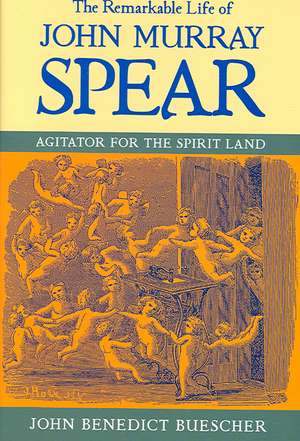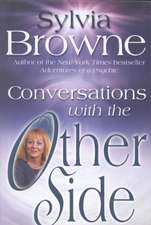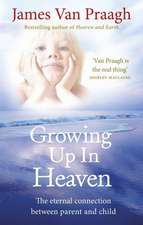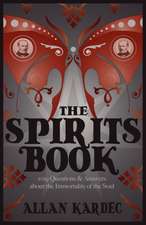The Remarkable Life of John Murray Spear – Agitator for the Spirit Land
Autor John Benedict Bueschen Limba Engleză Hardback – 14 sep 2006
Born in 1804, John Murray Spear started his career as a Universalist minister. He later was a close colleague of William Lloyd Garrison and Theodore Parker in the abolitionist movement, an operator on the underground railroad in Boston, an influential leader in the effort to end the death penalty and to reform prison conditions, and a public advocate of the causes of pacifism, women's rights, labor reform, and socialism. Buescher chronicles Spear's work as an activist among the New England reformers and Transcendentalists such as Bronson Alcott, Lydia Maria Child, and Dorothea Dix.
In mid-life Spear turned to the new revelation of spiritualism and came under the thrall of what he believed were spirit messages. Spear's spirits dictated that he and a small group of associates embark on plans for a perpetual motion machine, an electric ship propelled by psychic batteries, a vehicle that would levitate in the air, and a sewing machine that would work with no hands. As Buescher documents, Spear's spirit-guided efforts to harness technology to human liberation--sexual and otherwise--were far stranger than anyone outside his closest associates imagined, and were aimed at the eventual manufacturing of human beings and the improvement of the race. Buescher also examines the way in which Spear's story was minimized by his embarrassed fellow radicals. In the last years of his life, retired by the spirits and regarded by fellow Gilded Age progressives as a visitor from another age, if not another planet, Spear helped organize support for anarchist, socialist, peace, and labor causes. Buescher portrays Spear's life as an odd mixture of comic absurdity and serious foreshadowing of the future--for both good and ill--that provides us with a unique perspective on nineteenth-century American religious and social life.
Preț: 248.90 lei
Nou
Puncte Express: 373
Preț estimativ în valută:
47.63€ • 49.89$ • 39.47£
47.63€ • 49.89$ • 39.47£
Carte tipărită la comandă
Livrare economică 09-23 aprilie
Preluare comenzi: 021 569.72.76
Specificații
ISBN-13: 9780268022006
ISBN-10: 0268022003
Pagini: 380
Dimensiuni: 152 x 229 x 22 mm
Greutate: 0.65 kg
Ediția:1st Edition
Editura: MR – University of Notre Dame Press
ISBN-10: 0268022003
Pagini: 380
Dimensiuni: 152 x 229 x 22 mm
Greutate: 0.65 kg
Ediția:1st Edition
Editura: MR – University of Notre Dame Press
Recenzii
"Buescher offers a book on John Murray Spear, whose 19th-century life trajectory placed him in some of the period's most colorful and innovative religious and social movements. Born into a Universalist family, Spear was at turns a Universalist minister, abolitionist, spiritualist, pacifist, death penalty opponent, women's rights advocate, failed inventor of a perpetual motion machine, and vocal supporter of anarchists and socialists. . . . Recommended." —Choice(April 2007)
“In this richly detailed biography, Buescher takes seriously both Spear's most inspiriting ideas and his most outlandish in order to access the inner depths of nineteenth-century radicalism and unravel its hidden logic. . . . Buescher is one of the most knowledgeable students of lesser-used primary sources on nineteenth-century spiritualism. A generous citizen of this area of study, he makes a wealth of research materials including bibliographies, primary sources, and visual images available on his frequently updated website.” —American Historical Review, vol. 112, no. 5, December 2007
“Buescher's biography of John Murray Spear offers a transect through Spiritualism's heyday, from its rise in the reformist circles of the mid-nineteenth century to its increasingly eccentric and esoteric manifestations that marked the movement's decline toward the end of the century. Extensively researched and engagingly written, Buescher's biography of this influential and often notorious Spiritualist offers a vivid tour of some of the further reaches of nineteenth-century American culture.” —The Journal of American History, vol. 94, no. 1, June 2007
Notă biografică
John Benedict Buescher, chief of the Tibetan Broadcast Service of the Voice of America, received his Ph.D. from the University of Virginia in religious studies. He has published books and scholarly articles on the history of religion and comparative religion, including The Other Side of Salvation: Spiritualism in the Nineteenth-Century Religious Experience and Echoes from an Empty Sky: The Origins of the Buddhist Doctrine of Two Truths.
Descriere
“There is probably nobody living more qualified to write this work and nobody who has explored the available sources and contemplated the social meaning of nineteenth century spiritualism more completely than John Buescher. His contribution in this area is unprecedented and vital." —Mark A. Lause, University of Cincinnati
"John Buescher has written a lively, richly-detailed account—and sometimes free-swinging critique—of one of nineteenth-century America's most idiosyncratic and radical religious leaders. By turns warmly sympathetic to Spear and his spiritualist colleagues, then harshly critical of their ‘neo-gnostic’ tendencies, Buescher both tells a good story and draws many inferences for present-day religious and cultural debates. Even those who might draw different conclusions should be informed and engaged by the tale he tells." —David W. Wills, Winthrop H. Smith '16 Professor of American History and American Studies, Amherst College
"Grounded in seldom-used primary sources, this is a rigorously researched, clearly written, and fascinating biography of an important nineteenth-century radical. This volume on John Murray Spear is a valuable and necessary step to uncover the lived experience of spiritualism." —Stephen D. Andrews, Indiana University
John Murray Spear was one of nineteenth-century America's most interesting characters. A leading social agitator against slavery and capital punishment, Spear also became the nation's most flamboyant spiritualist, inventor of “spirit machines,” and advocate of free love. In his captivating biography, John Buescher brings to life Spear's superlatively odd story. While no photograph or engraving of Spear exists, and his letters and personal papers are scarce, Buescher recreates in this book a sympathetic, even heroic, figure who spent the most energetic decades of his career absent, in a sense, from his own life, displaced by other spirits.
Born in 1804, John Murray Spear started his career as a Universalist minister. Later he was a close colleague of William Lloyd Garrison and Theodore Parker in the abolitionist movement, an operator on the underground railroad in Boston, an influential leader in the effort to end the death penalty and to reform prison conditions, and a public advocate of the causes of pacifism, women's rights, labor reform, and socialism. Buescher chronicles Spear's work as an activist among the New England reformers and Transcendentalists such as Bronson Alcott, Lydia Maria Child, and Dorothea Dix.
In midlife Spear turned to the new revelation of spiritualism and came under the thrall of what he believed were spirit messages. Spear's spirits dictated that he and a small group of associates embark on plans for a perpetual motion machine, an electric ship propelled by psychic batteries, a vehicle that would levitate in the air, and a sewing machine that would work with no hands. As Buescher documents, Spear's spirit-guided efforts to harness technology to human liberation—sexual and otherwise—were far stranger than anyone outside his closest associates imagined, and were aimed at the eventual manufacturing of human beings and the improvement of the race. Buescher also examines the way in which Spear's story was minimized by his embarrassed fellow radicals. In the last years of his life, retired by the spirits and regarded by fellow Gilded Age progressives as a visitor from another age, if not another planet, Spear helped organize support for anarchist, socialist, peace, and labor causes. Spear's life, an odd mixture of comic absurdity and serious foreshadowing of the future, provides us with a unique perspective on nineteenth-century American religious and social life.













